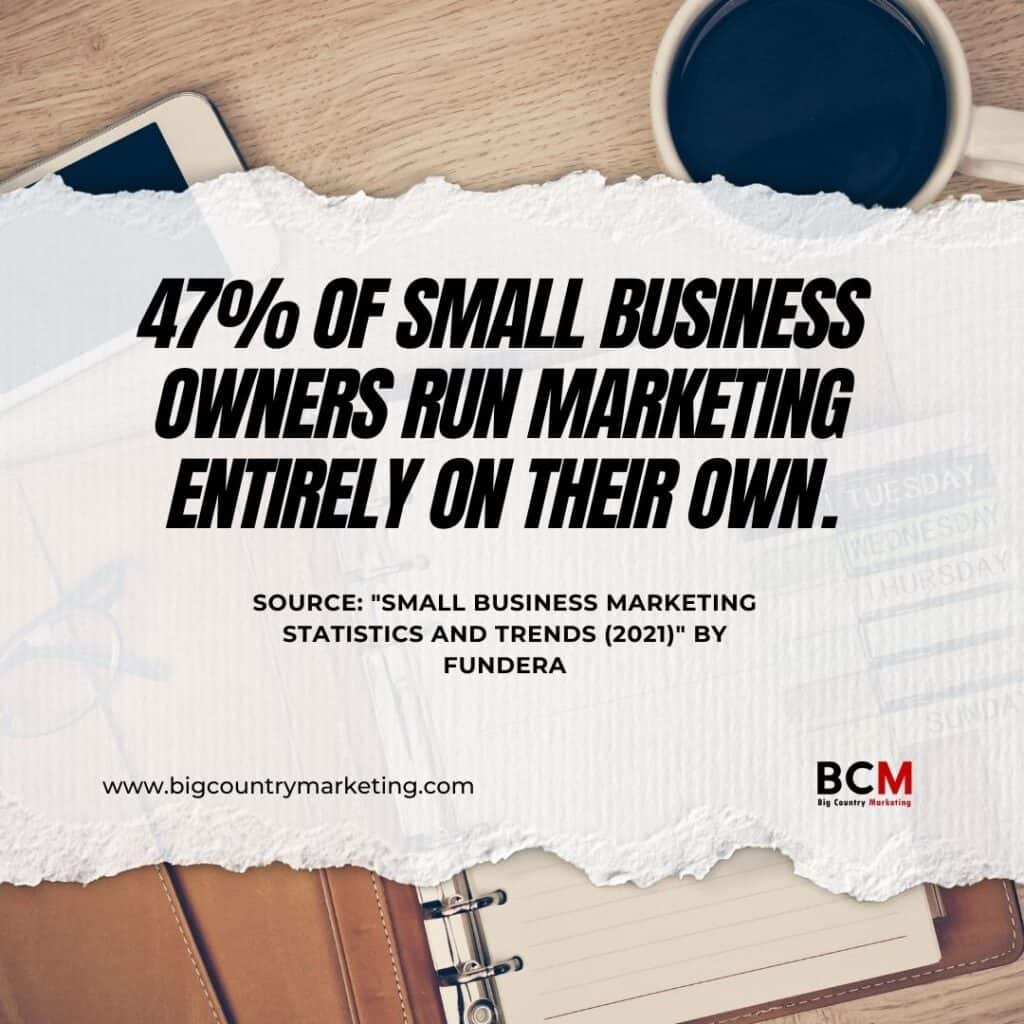What (Exactly) Is The Scope of Small Business Marketing?
Knowing the scope of small business marketing is important for busy business owners, as it helps identify key activities that must be done to not just bring in customers, but to build the brand as well.

It’s easy for business owners to get lost in the minutiae of day-to-day activities, usually juggling their marketing roles with other just-as-important aspects of the business such as operations, product development, customer service, or sales.
The scope of small business marketing involves action items that define your overall marketing activities. These typically include identifying your goals as a business, developing a marketing plan for your brand, implementing that plan, and evaluating your marketing campaigns for best results.
The action items may vary from venture to venture, but the scope of marketing efforts for most small businesses is covered by these key activities.
What Makes a Business a “Small Business”?
Whether it’s a local mom-and-pop neighborhood shop or a company that has a hundred employees, the term “small business” covers a wide variety of business ventures. Defining what a small business actually is largely depends on where you operate.
A small business is any business venture that operates with small budgets and small teams. In the United States, a small business generally has less than 500 employees, while in the European Union, the cap is at 50 employees.
So take note that the actual definition will certainly vary from country to country. And these definitions are laid down to figure out if a company qualifies for certain programs or government benefits, or is obligated to follow certain regulations.
What is the Importance of Small Business Marketing?
Small businesses need marketing for sustainable growth.
Through marketing, a small business can not just connect with potential customers, but also build trust and credibility as a brand. By means of different marketing activities, a small business has a better handle on its target market, encouraging more sales, and more repeat business.
In this manner, small businesses are able to compete (and stay competitive) even with larger, more established brands within their space.

A Review of Key Marketing Activities For Small Businesses
Marketing is mainly all about reaching out to your future customers to get the word out about your products and services.
But there’s certainly more to it than just telling your target audience what you offer. So when we talk about the scope of small business marketing, your marketing activities are likely to fall within these four key categories:
Identifying (and understanding) your goals
For most small business ventures, being able to bring in more sales is the key to growth. When talking about business goals, the more specific you are, the better.
Let’s assume you’ve already done a fairly comprehensive review of your brand. In all likelihood, you already have a vision of what you need your marketing to accomplish. You might want to:
- increase traffic to your website
- drive more phone calls
- get more customers to come through your doors
- entice folks to download your free ebook
- encourage your followers to check out your webinar
These are all examples of common marketing goals, but note that you also need to know how you’ll make it happen and how you determine if you succeeded. This is where SMART goals come in: goals need to be specific, measurable, attainable, relevant, and time-bound.
So, for example, if you want to increase your sales for a local cake shop, here’s how you might want to set your SMART goals:
- Let’s increase our cupcake orders by 200% in two months
- Let’s get 10 customers inquiring about our birthday cakes every day by July this year.
- Let’s sell 100 custom wedding cakes by the end of Q3
So as you can see, the key results are how you have qualified that your cake shop increased sales. Through the SMART goals you’ve put together, you’ve now determined that if you achieve each of those key results, then you have accomplished your objective.
“When talking about business goals, the more specific you are, the better.”
www.bigcountrymarketing.com
Developing your marketing plan
Now that you’ve identified your marketing goals, it’s now time to come up with a plan to get things done. For each of your SMART goals, you now have to make decisions: given your available resources (i.e. time, money, and manpower), what are the specific steps you need to take to take you closer to what you need to accomplish?
Going back to our example: “Let’s sell 100 custom wedding cakes by the end of Q3” You should now put together a list of actual activities to get this done. If you’re the owner of the cake shop, you might consider:
- Making a downloadable brochure available on your business website
- Sharing your best wedding cake photos (with accompanying stories) on social media
- Running ads on via Google or Facebook specifically targeting brides-to-be looking to get married in your neghborhood
- Enter into a partnership agreement with wedding venues and wedding planners in your area
- Joining local wedding fairs (that bring in soon-to-wed couples)
- Scheduling cake-tasting events for your inquiring customers
Now you know what are the specific action items to get your marketing efforts going. In this particular case, your marketing plan may involve:
- Compiling your 20 best wedding cake photos from previous events.
- Creating a brochure that has pricing information, terms and conditions, how to order a wedding cake, and your contact information available as a PDF (for downloading) or as an actual printout (for those visiting the cake shop)
- Create a calendar of social media posts using your cake photos as well as the information available on your brochures.
- Create ads specifically for Google and ads specifically for Facebook.
- Contacting and visiting wedding venues and wedding planners in your neighborhood and entering into a partnership. Of course, you’ll likely have a portfolio of your cake photos and a bunch of brochures along with you on your rounds.
- Invite your wedding vendor partners to join you on your scheduled cake tasting events.
- Looking into local wedding fairs to join and preparing your booth and other marketing collaterals for that event.
- Coming up with a special promotional offer or package for a limited time, or just for your scheduled cake-tasting events, or just for the wedding fair.
- Joining social media groups (of soon-to-weds or wedding vendors) and answer wedding-related questions as helpfully as you can.
- Actively get your wedding cakes featured on popular wedding websites within your market.
Remember, your plan should be comprehensive enough that you’ve mapped out your activities in a calendar, assigned a specific person for each task, and even having an allotted budget or block of time to get it done.
You’re also likely to utilize a lot of more low-cost or free channels to market your business, so you can put in whatever limited resources you might have into more priority line items, such as getting your website up and running, online ads, or outsourced work.
Implementing Your Marketing Plan
With a comprehensive marketing plan in place, now you can go ahead and execute it. Take note that while you do have a plan, you should also be flexible enough to prioritize quick gains or opportunities to close more business right away.
While executing your plan, you now also have a better idea of costs related to each action: are you spending more than you have anticipated? Do certain tasks need more of your attention? Does it make sense to outsource specific action items? Are there clusters of low-hanging fruit that you haven’t been aware of previously?
Evaluating Your Marketing Activities
Because you have limited resources, every penny counts. This is why you’ll have to monitor and analyze your various marketing efforts and campaigns to make sure you’re actually bringing in business (and not just bleeding money).
You should have a way of keeping track of how your leads are coming in: analytics from social media and from search analytics, a special tracking code from promotional efforts or from other traditional marketing channels, or maybe even a post-sales survey after a lead converts.
Simply put: you want to be able to double down on your efforts that work (since they bring home the bacon) and make adjustments on anything that isn’t quite working the way you want.

As a Business Owner, Should I Do My Own Small Business Marketing?
Marketing your own small business has a number of advantages especially when you’re just starting out. As a business owner, it’s important for you to have a pulse on the target market, so to speak, and be familiar with your company’s process of generating (and nurturing) leads.

In fact, almost half (47%) of small business owners run marketing entirely on their own. This should be fine at first, but as the business grows, these busy small business owners inevitably end up wearing too many hats.
Eventually, as you’re able to justify a little more budget, you can hire someone to assist you with your marketing. Whether you decide to outsource some tasks, get freelance help, or hire full-time employees, as long as you are able to achieve your overall marketing goals, you should do just fine.
What Factors Impact The Scope Of Marketing For Small Business Ventures?
The scope of small business marketing is limited by the following factors:
- Your bandwidth as a business owner
- Available resources– specifically, time, manpower, and marketing budget
- Your creativity
- Your ability to scale your marketing efforts
Understandably, as a business owner, marketing your products and services is something you should involve yourself in, especially in the early days of your business. As you continue to grow, however, you might decide to focus more on big-picture issues, and leave your marketing with a capable marketing team or a manager.
Having a budget for marketing is great, allowing you to advertise, acquire marketing tools and services, outsource some of your work, or spend on more collaterals for your marketing efforts.
Being creative or having more creative marketing initiatives can achieve more of an impact, at least compared to other small businesses within your space.
Finally, the ability to scale your marketing efforts is often achieved these days through marketing automation tools and other services that can help you generate even more leads, nurture them, and assist you in converting these into paying customers.
A Final Word About The Scope of Small Business Marketing
Marketing is a must for a small business– any business, in fact– with a desire to grow. Knowing the scope of small business marketing allows you to identify the activities and job roles that you need to keep track of and promote your business effectively even with a small team and a small budget.






